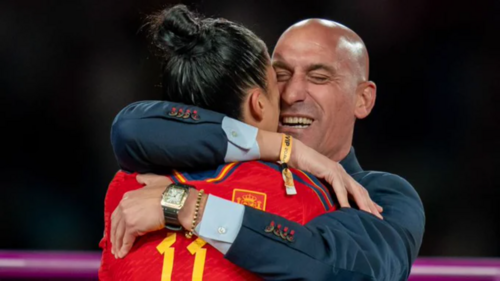News
Spanish Football Chief Criticised for Post-Match Lip Kiss with Player

Spanish football’s realm was trapped in a whirlwind of controversy as Luis Rubiales, the head of the Spanish Football Federation, faced widespread condemnation for a startling and controversial action. The incident in question transpired during the post-match medal presentation, a supposedly celebratory moment that became a discourse catalyst as reported by SBS News.
Also Read: Soccer Medals and Trophies of Former Chiefs Captain Stolen
Jenni Hermoso, a pivotal figure in the team’s conquest of their maiden Women’s World Cup title in Sydney, became the central character of this incident. As the victorious team embraced their achievements, Hermoso found herself at the heart of the moment, soon becoming a focal point of contention. Amidst the joy, Rubiales seized the moment, reaching out to grab Hermoso’s head, planting an uninvited kiss on her lips, and offering a pat on her back.
The repercussions of this action reverberated across online platforms, where critics and observers alike weighed in on the controversy. Former Socceroo Craig Foster, utilising the virtual megaphone of X (formerly known as Twitter), was among the voices that decried the incident. Foster’s disapproval was palpable as he labelled the moment as ‘horrific.’ His sentiment extended beyond mere critique, as he urged both FIFA and the Spanish FA to take decisive action and stand Rubiales down.
Women in sport are daily subject to an extreme power differential, objectification, harassment, sexual abuse and an absence of agency and power.
This is horrific.
He should be stood down immediately by @FIFAcom and the Spanish FA.#FIFAWWC https://t.co/pN5KYHXPAX
— Craig Foster (@Craig_Foster) August 20, 2023
The critique, however, was wider than Foster’s lone voice. Embedded within his condemnation was a broader concern – the differential power dynamics and objectification that women often encounter in sports. Foster articulated this sentiment, emphasising that women frequently grapple with a range of challenges that stem from an imbalance of power, harassment, objectification, and erosion of agency and influence.
In direct response to the incident, Hermoso’s own sentiment was candid. She honestly stated, “Yeah, I did not enjoy that.” This brief statement captured her immediate reaction, shedding light on her perspective on the unexpected display of affection.
However, Hermoso’s subsequent comments to the AFP via the Spanish Federation offered an alternate perspective. Hermoso framed the incident as a spontaneous expression of shared joy in this nuanced view. She noted that the immense joy from their World Cup victory culminated in this gesture of affection. Moreover, she conveyed the strength of her rapport with Rubiales, highlighting his outstanding behaviour and characterising the kiss as a natural manifestation of gratitude and fondness.
On the other side of the spectrum, Rubiales defended his actions, exhibiting dismissiveness towards the criticism. Speaking on the Spanish radio station MARCA, he trivialised the incident by stating, “The kiss with Jenni? Idiots are everywhere.” This retort revealed his exasperation with the backlash, portraying the act as an inconsequential display of affection that should not be subjected to overanalysing.
A ridiculously grim end to a World Cup that had brought so much joy.
Shameless abuse of power broadcast live to millions watching across the world https://t.co/caDdoODGyE https://t.co/tKemIaPx77
— Molly McElwee (@molly_mcelwee) August 20, 2023
Amidst this diverse chorus of voices, fans online voiced their sentiments, with some expressing disappointment and dismay at the gesture. One fan captured the mood by characterising the incident as a “ridiculously grim end to a World Cup that had brought so much joy.” Another observer pointed a critical finger at management, suggesting that any achievements by the women were despite, rather than because of, managerial decisions.
This incident was a sombre epilogue to Spain’s 1-0 victory over England in the final match. A celebration that followed was partitioned into distinct groups before a unifying culmination. Yet, the victory was not without its own history of tumult. The coach, Jorge Vilda, found his position questioned when 15 national players decided not to represent their country as long as he remained in charge. The reasons were multifaceted, ranging from training and facility issues to the level of support provided by the federation. The coach’s perceived authoritarian approach further fueled the discontent.
The culmination of conciliatory talks paved the way for a select group of players among ‘Las 15’ to appear at the World Cup while others were sidelined. Amidst these negotiations, key players such as Aitana Bonmati, Mariona Caldentey, and Ona Batlle emerged as representatives. However, notable names like Patri Guijarro and Mapi Leon, both winners of the Champions League with Barcelona, were left outside the fold.
Through it all, coach Vilda displayed unwavering determination, as underscored by his words, “You’re asking about the past.” He pointed to the backing and support he received from Rubiales, acknowledging the president’s courage and trust. This assertion painted a picture of unity amidst the trials and tribulations, highlighting the complexities that spanned from the controversial gesture to the culmination of Spain’s victorious World Cup journey.
President of the Spanish Football Federation, Luis Rubiales, Kissed Jenni Hermoso, striker of Spain. Weird
#WHUCHE Enzo #Asake02Arena #SpainVsEngland Ward Prowse Mudryk pic.twitter.com/o0AHerreIS
— Olamide Not Baddo (@Iam_Olamide10) August 20, 2023
Also Read:
Follow us on Google News
Photo: Twitter / @Craig Foster






















